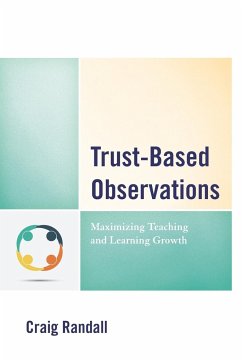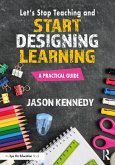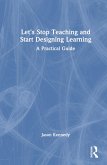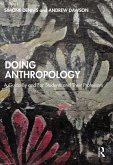- Broschiertes Buch
- Merkliste
- Auf die Merkliste
- Bewerten Bewerten
- Teilen
- Produkt teilen
- Produkterinnerung
- Produkterinnerung
Trust Based Observations teaches observers to build trusting relationships with teachers as they engage in frequent observations and reflective conversations with them. Using the manageable observation form and data driven goal setting, the result is teachers embrace risk-taking and take growth steps necessary for significant teaching improvement.
Andere Kunden interessierten sich auch für
![Let's Stop Teaching and Start Designing Learning Let's Stop Teaching and Start Designing Learning]() Jason KennedyLet's Stop Teaching and Start Designing Learning27,99 €
Jason KennedyLet's Stop Teaching and Start Designing Learning27,99 €![Let's Stop Teaching and Start Designing Learning Let's Stop Teaching and Start Designing Learning]() Jason KennedyLet's Stop Teaching and Start Designing Learning161,99 €
Jason KennedyLet's Stop Teaching and Start Designing Learning161,99 €![Observations On The Popular Antiquities Of Great Britain Observations On The Popular Antiquities Of Great Britain]() John BrandObservations On The Popular Antiquities Of Great Britain28,99 €
John BrandObservations On The Popular Antiquities Of Great Britain28,99 €![The Biological Basis of Clinical Observations The Biological Basis of Clinical Observations]() William T. Blows (UK City University London)The Biological Basis of Clinical Observations58,99 €
William T. Blows (UK City University London)The Biological Basis of Clinical Observations58,99 €![Doing Anthropology Doing Anthropology]() Simone DennisDoing Anthropology42,99 €
Simone DennisDoing Anthropology42,99 €![The Teaching and Learning Playbook The Teaching and Learning Playbook]() Michael FeelyThe Teaching and Learning Playbook175,99 €
Michael FeelyThe Teaching and Learning Playbook175,99 €![Visible Learning Insights Visible Learning Insights]() John Hattie (Australia University of Melbourne)Visible Learning Insights40,99 €
John Hattie (Australia University of Melbourne)Visible Learning Insights40,99 €-
-
-
Trust Based Observations teaches observers to build trusting relationships with teachers as they engage in frequent observations and reflective conversations with them. Using the manageable observation form and data driven goal setting, the result is teachers embrace risk-taking and take growth steps necessary for significant teaching improvement.
Hinweis: Dieser Artikel kann nur an eine deutsche Lieferadresse ausgeliefert werden.
Hinweis: Dieser Artikel kann nur an eine deutsche Lieferadresse ausgeliefert werden.
Produktdetails
- Produktdetails
- Verlag: Rowman & Littlefield
- Seitenzahl: 214
- Erscheinungstermin: 15. September 2020
- Englisch
- Abmessung: 229mm x 152mm x 13mm
- Gewicht: 338g
- ISBN-13: 9781475853568
- ISBN-10: 1475853564
- Artikelnr.: 58703026
- Herstellerkennzeichnung
- Libri GmbH
- Europaallee 1
- 36244 Bad Hersfeld
- gpsr@libri.de
- Verlag: Rowman & Littlefield
- Seitenzahl: 214
- Erscheinungstermin: 15. September 2020
- Englisch
- Abmessung: 229mm x 152mm x 13mm
- Gewicht: 338g
- ISBN-13: 9781475853568
- ISBN-10: 1475853564
- Artikelnr.: 58703026
- Herstellerkennzeichnung
- Libri GmbH
- Europaallee 1
- 36244 Bad Hersfeld
- gpsr@libri.de
By Craig Randall
Table of Contents
Acknowledgments
Introduction
Part One: Observation Problems and Solutions
Chapter 1. So What's the Problem?
What Can Be Done
Chapter 2. The Solution: Trust Based Observations
Build Safe, Trusting Relationships
Tweak Evaluation
Additional Solutions
Part Two: The TBO System and Making it Work
Chapter 3. The System Basics: Continuous, Frequent, Unannounced, and Short
Observations
Why Unannounced?
Why a Continuous Cycle?
Why 20 Minutes?
Why Observe All Teachers Equally?
Troubleshooting
Chapter 4. Building System Success: Creating Time and Getting Organized
Creating and Prioritizing Time
Organization Tools
Part Three: The Observation
Chapter 5. Trust Based Observations Form: Origins and Development
Chapter 6. Starting an Observation
Chapter 7. Evidence of...
Early Thoughts to Guide Successful Observations
Evidence of
Learning Target (LT)
Risk Taking/Innovative Practice
Teacher/Student Rapport and Relationship
Classroom and Student Behavior Management
Cooperative Learning
Working Memory: 10-2 Reflection and Processing Time
Questioning/Higher Order Thinking
Formative Assessment/Knowing What Each Student Has Learned to Guide Next
Steps
Descriptive Progress Feedback
Specific Differentiation
Learning Principles Used
Student Interview: (Is Learning Clear to All?)
Teaching Intangibles
Scripting
Additional Pedagogy
Questions
Suggestions
Chapter 8. Questions
Chapter 9. Web Links: Trust Based Observations as a Resource Tool
Part 4: The Reflective Conversation
Chapter 10. Reflective Conversation System Basics
Prioritize Reflective Conversations
Organization
Respect
The Conversation
Chapter 11. Building Trusting Relationships
Vulnerability
Empathy and Emotional Intelligence
Actions that Build Trust
Mindsets or Actions that Inhibit Trust
Chapter 12. Listening and Asking the Questions
Listening
The Questions
Chapter 13. Sharing Evidence of
Troubleshooting Additional Observer Questions on Sharing Evidence
Chapter 14. Offering Suggestions
When to Offer Suggestions
Preparation
What and How Much to Suggest
Words Matter: How to Offer Suggestions
Explaining What Continuing Support Looks Like and Entails
Troubleshooting Challenges to Offers of Suggestions
Chapter 15. Specials: Course Connections Accountability
Part Five: The Teacher Evaluation Process and Professional Development
Chapter 16. Self-Assessment: Trust Based Observation Form Rubric
TBO Pedagogy Rubric
Action Research Big Goal
Chapter 17. Evaluation in Trust Based Observations
TBO Evaluation
Preparing for the Summative Evaluation Meeting
The Meeting
Chapter 18. Action Improvement Plans and Difficult Conversations
Action Improvement Plans
Difficult Conversations
Chapter 19. TBO and Professional Development
Question of the Year PD
PDC and Action Research Big Goals
More on PDC's
Further PD Tips, Suggestions, Guidelines
Part Six: Bringing It All Together
Chapter 20. Building TBO Success
Implementation
Blending
Change
Sustaining Success
Bibliography
About the Author
Acknowledgments
Introduction
Part One: Observation Problems and Solutions
Chapter 1. So What's the Problem?
What Can Be Done
Chapter 2. The Solution: Trust Based Observations
Build Safe, Trusting Relationships
Tweak Evaluation
Additional Solutions
Part Two: The TBO System and Making it Work
Chapter 3. The System Basics: Continuous, Frequent, Unannounced, and Short
Observations
Why Unannounced?
Why a Continuous Cycle?
Why 20 Minutes?
Why Observe All Teachers Equally?
Troubleshooting
Chapter 4. Building System Success: Creating Time and Getting Organized
Creating and Prioritizing Time
Organization Tools
Part Three: The Observation
Chapter 5. Trust Based Observations Form: Origins and Development
Chapter 6. Starting an Observation
Chapter 7. Evidence of...
Early Thoughts to Guide Successful Observations
Evidence of
Learning Target (LT)
Risk Taking/Innovative Practice
Teacher/Student Rapport and Relationship
Classroom and Student Behavior Management
Cooperative Learning
Working Memory: 10-2 Reflection and Processing Time
Questioning/Higher Order Thinking
Formative Assessment/Knowing What Each Student Has Learned to Guide Next
Steps
Descriptive Progress Feedback
Specific Differentiation
Learning Principles Used
Student Interview: (Is Learning Clear to All?)
Teaching Intangibles
Scripting
Additional Pedagogy
Questions
Suggestions
Chapter 8. Questions
Chapter 9. Web Links: Trust Based Observations as a Resource Tool
Part 4: The Reflective Conversation
Chapter 10. Reflective Conversation System Basics
Prioritize Reflective Conversations
Organization
Respect
The Conversation
Chapter 11. Building Trusting Relationships
Vulnerability
Empathy and Emotional Intelligence
Actions that Build Trust
Mindsets or Actions that Inhibit Trust
Chapter 12. Listening and Asking the Questions
Listening
The Questions
Chapter 13. Sharing Evidence of
Troubleshooting Additional Observer Questions on Sharing Evidence
Chapter 14. Offering Suggestions
When to Offer Suggestions
Preparation
What and How Much to Suggest
Words Matter: How to Offer Suggestions
Explaining What Continuing Support Looks Like and Entails
Troubleshooting Challenges to Offers of Suggestions
Chapter 15. Specials: Course Connections Accountability
Part Five: The Teacher Evaluation Process and Professional Development
Chapter 16. Self-Assessment: Trust Based Observation Form Rubric
TBO Pedagogy Rubric
Action Research Big Goal
Chapter 17. Evaluation in Trust Based Observations
TBO Evaluation
Preparing for the Summative Evaluation Meeting
The Meeting
Chapter 18. Action Improvement Plans and Difficult Conversations
Action Improvement Plans
Difficult Conversations
Chapter 19. TBO and Professional Development
Question of the Year PD
PDC and Action Research Big Goals
More on PDC's
Further PD Tips, Suggestions, Guidelines
Part Six: Bringing It All Together
Chapter 20. Building TBO Success
Implementation
Blending
Change
Sustaining Success
Bibliography
About the Author
Table of Contents
Acknowledgments
Introduction
Part One: Observation Problems and Solutions
Chapter 1. So What's the Problem?
What Can Be Done
Chapter 2. The Solution: Trust Based Observations
Build Safe, Trusting Relationships
Tweak Evaluation
Additional Solutions
Part Two: The TBO System and Making it Work
Chapter 3. The System Basics: Continuous, Frequent, Unannounced, and Short
Observations
Why Unannounced?
Why a Continuous Cycle?
Why 20 Minutes?
Why Observe All Teachers Equally?
Troubleshooting
Chapter 4. Building System Success: Creating Time and Getting Organized
Creating and Prioritizing Time
Organization Tools
Part Three: The Observation
Chapter 5. Trust Based Observations Form: Origins and Development
Chapter 6. Starting an Observation
Chapter 7. Evidence of...
Early Thoughts to Guide Successful Observations
Evidence of
Learning Target (LT)
Risk Taking/Innovative Practice
Teacher/Student Rapport and Relationship
Classroom and Student Behavior Management
Cooperative Learning
Working Memory: 10-2 Reflection and Processing Time
Questioning/Higher Order Thinking
Formative Assessment/Knowing What Each Student Has Learned to Guide Next
Steps
Descriptive Progress Feedback
Specific Differentiation
Learning Principles Used
Student Interview: (Is Learning Clear to All?)
Teaching Intangibles
Scripting
Additional Pedagogy
Questions
Suggestions
Chapter 8. Questions
Chapter 9. Web Links: Trust Based Observations as a Resource Tool
Part 4: The Reflective Conversation
Chapter 10. Reflective Conversation System Basics
Prioritize Reflective Conversations
Organization
Respect
The Conversation
Chapter 11. Building Trusting Relationships
Vulnerability
Empathy and Emotional Intelligence
Actions that Build Trust
Mindsets or Actions that Inhibit Trust
Chapter 12. Listening and Asking the Questions
Listening
The Questions
Chapter 13. Sharing Evidence of
Troubleshooting Additional Observer Questions on Sharing Evidence
Chapter 14. Offering Suggestions
When to Offer Suggestions
Preparation
What and How Much to Suggest
Words Matter: How to Offer Suggestions
Explaining What Continuing Support Looks Like and Entails
Troubleshooting Challenges to Offers of Suggestions
Chapter 15. Specials: Course Connections Accountability
Part Five: The Teacher Evaluation Process and Professional Development
Chapter 16. Self-Assessment: Trust Based Observation Form Rubric
TBO Pedagogy Rubric
Action Research Big Goal
Chapter 17. Evaluation in Trust Based Observations
TBO Evaluation
Preparing for the Summative Evaluation Meeting
The Meeting
Chapter 18. Action Improvement Plans and Difficult Conversations
Action Improvement Plans
Difficult Conversations
Chapter 19. TBO and Professional Development
Question of the Year PD
PDC and Action Research Big Goals
More on PDC's
Further PD Tips, Suggestions, Guidelines
Part Six: Bringing It All Together
Chapter 20. Building TBO Success
Implementation
Blending
Change
Sustaining Success
Bibliography
About the Author
Acknowledgments
Introduction
Part One: Observation Problems and Solutions
Chapter 1. So What's the Problem?
What Can Be Done
Chapter 2. The Solution: Trust Based Observations
Build Safe, Trusting Relationships
Tweak Evaluation
Additional Solutions
Part Two: The TBO System and Making it Work
Chapter 3. The System Basics: Continuous, Frequent, Unannounced, and Short
Observations
Why Unannounced?
Why a Continuous Cycle?
Why 20 Minutes?
Why Observe All Teachers Equally?
Troubleshooting
Chapter 4. Building System Success: Creating Time and Getting Organized
Creating and Prioritizing Time
Organization Tools
Part Three: The Observation
Chapter 5. Trust Based Observations Form: Origins and Development
Chapter 6. Starting an Observation
Chapter 7. Evidence of...
Early Thoughts to Guide Successful Observations
Evidence of
Learning Target (LT)
Risk Taking/Innovative Practice
Teacher/Student Rapport and Relationship
Classroom and Student Behavior Management
Cooperative Learning
Working Memory: 10-2 Reflection and Processing Time
Questioning/Higher Order Thinking
Formative Assessment/Knowing What Each Student Has Learned to Guide Next
Steps
Descriptive Progress Feedback
Specific Differentiation
Learning Principles Used
Student Interview: (Is Learning Clear to All?)
Teaching Intangibles
Scripting
Additional Pedagogy
Questions
Suggestions
Chapter 8. Questions
Chapter 9. Web Links: Trust Based Observations as a Resource Tool
Part 4: The Reflective Conversation
Chapter 10. Reflective Conversation System Basics
Prioritize Reflective Conversations
Organization
Respect
The Conversation
Chapter 11. Building Trusting Relationships
Vulnerability
Empathy and Emotional Intelligence
Actions that Build Trust
Mindsets or Actions that Inhibit Trust
Chapter 12. Listening and Asking the Questions
Listening
The Questions
Chapter 13. Sharing Evidence of
Troubleshooting Additional Observer Questions on Sharing Evidence
Chapter 14. Offering Suggestions
When to Offer Suggestions
Preparation
What and How Much to Suggest
Words Matter: How to Offer Suggestions
Explaining What Continuing Support Looks Like and Entails
Troubleshooting Challenges to Offers of Suggestions
Chapter 15. Specials: Course Connections Accountability
Part Five: The Teacher Evaluation Process and Professional Development
Chapter 16. Self-Assessment: Trust Based Observation Form Rubric
TBO Pedagogy Rubric
Action Research Big Goal
Chapter 17. Evaluation in Trust Based Observations
TBO Evaluation
Preparing for the Summative Evaluation Meeting
The Meeting
Chapter 18. Action Improvement Plans and Difficult Conversations
Action Improvement Plans
Difficult Conversations
Chapter 19. TBO and Professional Development
Question of the Year PD
PDC and Action Research Big Goals
More on PDC's
Further PD Tips, Suggestions, Guidelines
Part Six: Bringing It All Together
Chapter 20. Building TBO Success
Implementation
Blending
Change
Sustaining Success
Bibliography
About the Author









